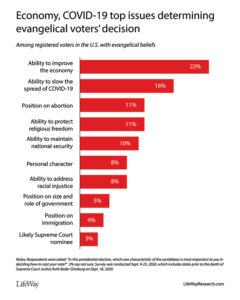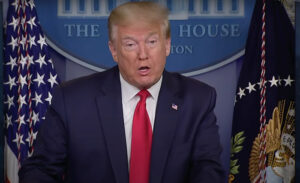By Aaron Earls
LifeWay Research
 NASHVILLE — Evangelicals seem ready to cast their ballots in the 2020 election. Nine in 10 evangelicals by belief are registered to vote, and few are undecided about their presidential choice.
NASHVILLE — Evangelicals seem ready to cast their ballots in the 2020 election. Nine in 10 evangelicals by belief are registered to vote, and few are undecided about their presidential choice.
A new survey from Nashville-based LifeWay Research conducted Sept. 9-23 finds President Donald Trump with a sizable lead over Democratic nominee Joe Biden among likely voters with evangelical beliefs.
Deep divides, however, persist among evangelicals across ethnic lines.
Overall, 61 percent of evangelicals by belief plan to vote for Trump and 29 percent for Biden. Other candidates garner around 2 percent combined.
Fewer than one in 10 (8 percent) are undecided.
Evangelicals by belief are also twice as likely to identify as a Republican (51 percent) than a Democrat (23 percent). One in 5 (20 percent) say they are independent.
“Voting for or against an incumbent president is a more certain situation for voters,” said Scott McConnell, executive director of LifeWay Research. “Fewer Americans, including those with evangelical beliefs, are on the fence than at this same point in 2016.”
Presidential preferences
Voting plans for Americans without evangelical beliefs are almost the mirror opposite of their evangelical counterparts, with Biden holding a commanding 56 percent to 33 percent lead over Trump.
President Trump’s advantage among evangelicals, however, comes primarily from white evangelicals, among whom he leads Biden 73 percent to 18 percent.
African Americans with evangelical beliefs overwhelmingly plan to vote for Biden (69 percent to 19 percent). Among American evangelicals of other ethnicities, however, Trump has a 58 percent to 32 percent lead.
While almost a quarter of white evangelicals were undecided or supporters of a third party in 2016, few say the same in 2020. Only 2 percent back a third-party candidate this year, compared to 8 percent four years ago. And while 16 percent were undecided in 2016, that number fell to 7 percent this year.
Key election issues
Improving the economy and fighting the pandemic are the top characteristics registered voters say they are looking for in a presidential candidate. Evangelicals agree but are much more likely to also point to abortion and religious liberty as factors.
A majority of registered voters say an ability to improve the economy (72 percent), slowing the spread of COVID-19 (58 percent) and maintaining national security (55 percent) are important factors in deciding their vote.
Close to half say the same about addressing racial injustice (49 percent), personal character (48 percent) and the candidate’s position on immigration (48 percent).
In the survey, which began prior to Supreme Court Justice Ruth Bader Ginsburg’s death, a third (33 percent) say likely Supreme Court nominees are an important factor. Similar numbers point to the candidate’s ability to protect religious freedom (32 percent), their position on abortion (31 percent) and their position on the size and role of government (30 percent).
Trump voters are more likely than Biden voters to say the economy (82 percent), national security (67 percent), immigration (62 percent), religious freedom (49 percent), abortion (44 percent), Supreme Court nominees (42 percent), and the size and role of government (40 percent) are important issues in determining their vote.
Biden voters are more likely than Trump voters to point to COVID-19 (75 percent), racial injustice (68 percent) and personal character (66 percent).
When asked the single most important issue in determining their vote, 26 percent of registered voters point to the economy, 22 percent say slowing the spread of COVID-19 and 15 percent say personal character. No other issue garners more than eight percent.
Among evangelicals by belief registered to vote, improving the economy (22 percent) and slowing COVID-19 (16 percent) remain the top issues, but the candidates’ position on abortion (11 percent), and ability to protect religious freedom (11 percent) are more likely to be the top priority compared to those without evangelical beliefs.
“Most evangelicals are not single-issue voters,” said McConnell. “Eighty-nine percent of those with evangelical beliefs selected more than one important issue that is influencing their vote. Like other Americans, their top concerns reflect the current recession and pandemic, but more than one in 10 with evangelical beliefs will vote for the candidate they think will protect religious freedom.” B&R — See full story at https://www.baptistpress.com/resource-library/news/most-evangelicals-choose-trump-over-biden-but-clear-divides-exist/

